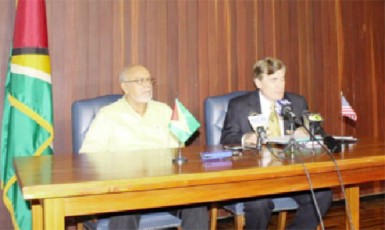A United States Drug Enforcement Agency (DEA) office will be established here and outgoing US Ambassador to Guyana Brent Hardt says it is part of a shift to boost Washington’s presence in the region.
“I am… very pleased that we will be establishing a DEA country office here at our Embassy in Georgetown,” Hardt announced at a joint press conference at the Office of the President.
Hardt explained that while the DEA had been working with Guyana’s anti-narcotics and law enforcement agencies, he always believed that an office on the ground in this country would allow the counter-narcotics cooperation to be taken to another level.

“It’s a major difference if you are coming here… whatever that frequency, to being on the ground every day working with your local partners,” he stated.
“There is definitely a shift to this region as we work closely with Mexico and Central America to tighten up some of the areas there. So, this does have a strategic purpose in that sense; that the flows are increasing and there is need to boost our presence and engagement in the Caribbean,” he added.
Hardt explained that the office would be based at the Duke Street, Kingston Embassy complex but other units will work at a facility determined by government.
President Donald Ramotar welcomed the US congress’ decision to okay the funding for the project. He said that from the beginning of his tenure, it was something he wanted.
He said that he wanted to make Guyana “totally inhospitable to those who traffic illicit drugs” and sees the move to have the DEA office here as a major step forward in this area.
In response to having the DEA office housed in the embassy, Ramotar said he thought it was a means of cutting cost as “even rich countries like the United States look at cost too.”
In February of this year, government maintained that it was the US that had refused offers by it to obtain a building to set up the DEA office here in 2005.
Earlier this year, Presidential advisor Gail Teixeira said the DEA made representation in 2004 to the Guyana government to set up an office in Guyana but that did not occur.
Teixeira said that she was the Minister of Home Affairs at the time and that she personally took the DEA agent to four properties in Guyana that the government was offering to use as the headquarters for the DEA in Guyana in 2005. However, she added that the US said it did not want those properties and it was not going to put in the $10M or $20M to secure them for the purposes of the DEA and that was the end of the matter.
“I’m talking from my personal experience,” she stressed. “I personally took the man with (Head of the Presidential Secretariat) Dr. (Roger) Luncheon to see four properties in Guyana– four–that in our view, from our security people … were properly located for the purposes of the DEA and they turned down each of the properties,” she said.
In a January 6, 2006 diplomatic cable, which has since been made public by WikLeaks, then US Ambassador Roland Bullen had noted that the US government held discussions with the Government of Guyana (GoG) off and on since 1999 about setting up a DEA presence in Guyana. He said several issues had prevented the establishment of a DEA presence here. “The current stumbling block is the GoG’s inability or reluctance to give approval for basic logistical details,” he explained. Bullen added that the US government was ready to work with and advise the GoG “as soon as the GoG is fully prepared to move forward in its fight against narco-trafficking.”
Later that same year, Bullen made a case for the establishment of a DEA office here, warning that the influence of narco-trafficking was creating conditions for the emergence of a narco-state.
“The level of narco-trafficking influence on the political, judicial and economic systems in Guyana creates ripe conditions for the emergence of a narco-state,” he warned.
The next year, US Embassy Charge d’ Affaires Michael Thomas, in an August 29, 2007 cable, requested that a US$100,000 allotment for the creation of the vetted unit be reallocated for a drug demand reduction project. He noted that no funds from the allocation had been used, since government’s positions had scuttled the initiative. “The vetted unit project is no longer viable due to the Government of Guyana’s failure to identify an acceptable location for the unit and their lack of progress in addressing drug trafficking issues,” Thomas said.









